I have continued my eastward trend and have come to Japan. Before commenting on all the zany things this country has, and how completely different two neighbouring countries can be, I’ll say a few things about China:
I spent 64 days in China including Hong Kong, and visited 17 provinces in an “ADD” style of travel. Of course I missed a lot, but got a very brief taste for much of the country, leaving for another time the furthest reaches of the north-east and the south-west.
My summary? The country is a world unto itself: The history is long, the country vast, the population enormous, and the ethnic variations rich. With nearly 1 billion people’s individual storylines woven across 2000 years of history, art, music, culture, loves and losses — I feel like my world has literally doubled in size. Most of the young people desperately want to travel within their own borders before ever considering moving away or traveling outside of China. Many even have shockingly little knowledge about the outside world — because to them, like I highlighted earlier, China is the world.
The country is a world unto itself: The history is long, the country vast, the population enormous, and the ethnic variations rich. With nearly 1 billion people's individual storylines woven across 2000 years of history, art, music, culture, loves and losses — I feel like my world has literally doubled in size.
I spent my final days in Beijing eating Peking Duck and having engaging discussion with Oker (who spent longer in China than I, and speaks the language), and returning to the restaurant a few nights later for the most expensive dinner of the trip with Jordan. In between, Jordan and I visited the most hiliariously menu’d restaurant in China Our choices included (rewritten exactly as shown):
- Heat the oil Splash at Similar Stick The Noodles
- Like Helmets The Noodles 1
- Northwest sheep face
And our favourite,
- Sour odor hot amorphophallus riveri filament 2
We laughed until we cried and the waitress who spoke zero english must have thought we were mad.
We also visited the Olympic buildings, with great difficulty: We couldn’t ride the metro to them without event tickets. So after crossing one intersection (passing 23 police officers, and few tourists) we found the bus that took us near the Bird’s Nest and Water Cube buildings. As you’ve probably all seen from watching the spectacular opening ceremonies, the buildings are truly magnificent. But what you didn’t see is the distasteful military barracks — complete with camoflouge trucks, portable trailers and tall razor wire fencing — that they dumped in front of those wonderful buildings.
So, I’m in Japan, a land where toilets sense your approach and welcomingly open their lids and heat up the seat; and if you’re feeling adventurous you can press a button and experience a refreshing but tickling spray of water to do the wiping for you. At this moment I’m not writing to you from a toilet — though that would be pretty cool — but from an internet & manga (comic book) cafe. My spacious private cubicle has a padded floor, beanbag chair, and sheets. I’m staying the night by buying a night package for $20, and they even have free drinks and a shower. This is a far cry from the warehouse-sized cafes in China where a sea of young people hack away at each other’s virtual selves in online video games.Culture Shock summary, so far:
- when taking the train in Japan I noticed demarcated lines on the floor where people calmly queue; and passengers disembark the trains before the others embark. In China a wave of embarking passengers push their way onto trains as you exit by swimming salmon-like through them.
- after a spectacular fireworks display in Kyoto I noticed all the people carrying their rubbish out of the park with them. In China the streets and public places are spotless, but not because people are clean. On the contrary — people through trash wherever they please — but an army of migrant workers roam public streets and parks cleaning up.
- Japanese being much richer are consequently larger. I have noticed far more obesity, and also much taller people here than in China. But people are also more active here, running or playing baseball in the parks; whereas in China people seem to be more sedentary but stay slim through healthy diet and very light exercise. (You’ll often come across groups of 50+ people performing Richard Simmons-esque light aerobics)
- My first impression of how people appear differently is that (generalisation warning!): Japanese tend to have larger eyes, noses, and jaws than Chinese; and the women have shorter legs.
- I realized what a monoculture China is in terms of style. Most young people dress very conservatively, but the women very elegantly. Business men tend to wear formal pants and shoes with golf-shirts. But in Japan the style is of the extreme kind. Businessmen wear formal suits with jackets in 35 degree heat. Some young people have outreageous bleached hairdos, heavy makeup, glasses frames you’d wear in Halloween, wild hats — many young people even dress in traditional kimonos with wooden sandals — the variation is endless.
Its quite daunting to be once again completely incapable of communication. All that Mandarin down the toilet! So far everyone in Kyoto and Hiroshima has fundamental english comprehension, but this won’t be the case in the countryside.
I’m finding Japanese much harder to pickup than Chinese, because everything is at least triple the syllables to remember. It doesn’t help that most verbs and many nouns have polite suffixes that must always be added. Or that sentences are constructed subject-object-verb; or that that counting up numbers and counting up objects are completely different numbering systems. *sigh* I’ll just point at the phrasebook or mime my way around the country.
Click the thumbnail above for some other great photographs and stories.
Sayonara,
-Mi-e-ku Fu-ra

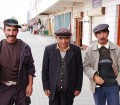
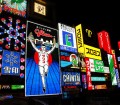
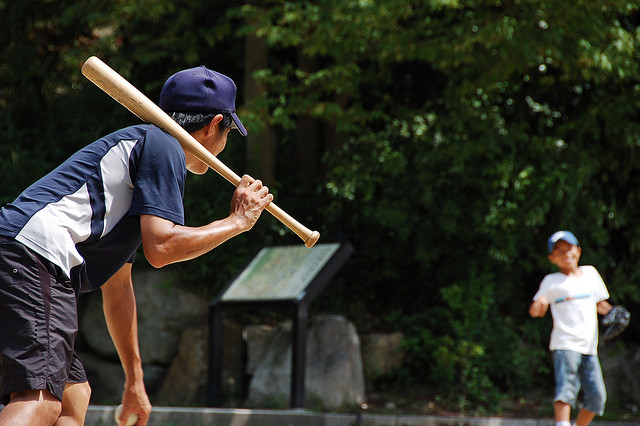
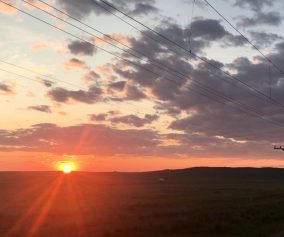
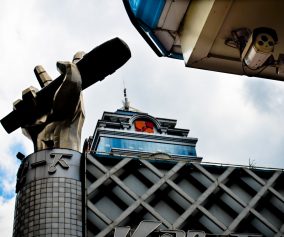
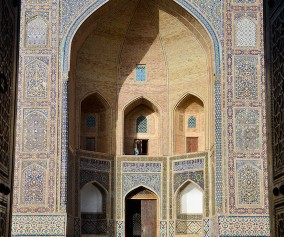
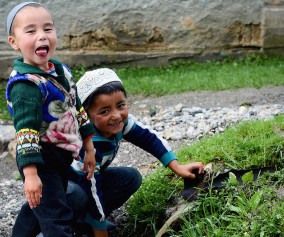
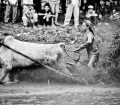

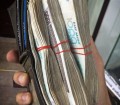
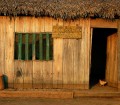
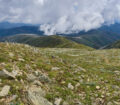
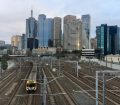


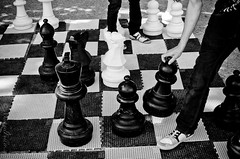
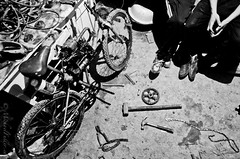

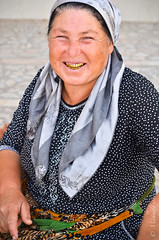
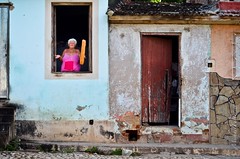


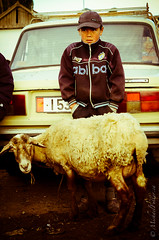
love the map, especially how it shows your different modes of transport! now I’m wondering if you wrote about your passenger ship journey to yiching…
I actually didn’t write much about that leg (just checked http://michaelfuller.ca/updates-galore/ ), which is strange because it was quite surreal. The Captain thought we had made a mistake by booking the 12 bed dorm, and gave us the 4 bed instead :)
I also met a grown woman who had never seen a real-life white person before.
It was wild.